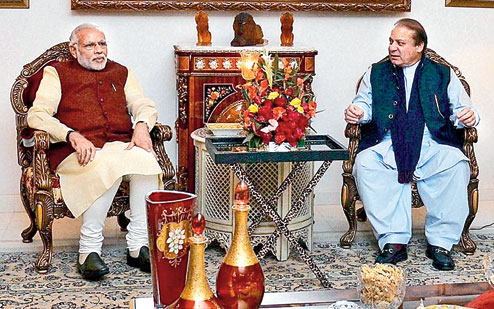
New Delhi, Jan. 2: The terror attack in Pathankot has sprung on the Narendra Modi government its first major test on ties with Pakistan after the Prime Minister's dramatic "drop-by" visit to Lahore, forcing it to confront a choice that was easier for its two predecessors to make.
The attack, which had killed at least three Indian Air Force personnel till this evening, was not unexpected and fits a pattern of provocation from sections across the border unhappy with any bilateral progress towards peace.
But Modi's response to the attack will reveal his pick in a choice familiar for two decades to Indian governments that have tried to negotiate a steady dialogue with Pakistan, officials and analysts said.
Till late evening, the foreign office was clear that the planned foreign secretary-level talks scheduled for January 15 and 16 in Islamabad were still on, and that the top diplomats would chart out a road map for a "comprehensive dialogue" agreed to in December.
"Operations continuing, immediate focus on resolving situation," foreign ministry spokesperson Vikas Swarup tweeted. "Premature to say any more at this point."
If the dialogue remains unaffected, Modi would have followed the path of Prime Ministers Atal Bihari Vajpayee and Manmohan Singh who repeatedly tried to ignore provocations from across the border as long as they could to try and forge a peace road map with Islamabad.
But Modi, whose government has already made serial about-turns in its Pakistan policy, came to power with far harsher rhetoric against Islamabad - and terror from across the border - than either Vajpayee or Singh.

on Saturday. (AFP)
Modi and the BJP had repeatedly accused the UPA government under Singh of being "soft on terror" because the then Prime Minister had tried to insulate the talks process from incidents like the attack in Pathankot.
"This was totally expected," diplomat Satyabrata Pal, who was the Indian high commissioner to Pakistan at the time of the November 2008 Mumbai terror attacks, told The Telegraph. "Any time that there has been a hint of seriousness in both India and Pakistan to work towards a rapprochement, sections that stand to lose from this have tried to provoke tensions."
The attack comes after a month of hectic diplomacy between India and Pakistan that saw Modi meet his counterpart Nawaz Sharif twice within four weeks - first in Paris on the margins of the UN climate change summit and then in Lahore.
In between those two meetings, the national security advisers of the two countries met in Bangkok. On December 9, foreign minister Sushma Swaraj announced with her counterpart Sartaj Aziz in Islamabad that the two countries would resume what was earlier called a "composite dialogue" - talks that cover the spectrum of disputes and confidence-building measures.
Addressing the Rajya Sabha after her return from Islamabad, Sushma had conceded the possibility of terror attacks meant to derail the peace attempt.
"We must not allow ourselves to get provoked easily," Sushma had said while responding to questions in the upper House on her visit to Pakistan.
Senior officials familiar with the negotiations with Pakistan had hinted in early December itself that they did not expect the course agreed to by Modi and Sharif to run smoothly - and that western pressure was a key factor behind the Prime Minister's recent outreach.
But Saturday's attack comes two weeks before the foreign secretaries of the two countries meet.
"That was quick," former Jammu and Kashmir chief minister Omar Abdullah tweeted. "Here's the first major challenge to PM Modi's bold Pakistan gambit."
Pakistan's foreign ministry was quick to condemn the attack. "Building on the goodwill created during the recent high level contacts between the two countries, Pakistan remains committed to partner with India to completely eradicate the menace of terrorism afflicting South Asian region," it said in a statement.
But after every incident like the Pathankot attack, the Indian government makes an assessment, officials said, of the level of support the strike enjoyed from across the border. Terror groups like the Lashkar-e-Toiba and the Jaish-e-Mohammed - suspected of having a role in the Pathankot attack - have long had tacit support from elements within the Pakistan army.
"The mistake we have sometimes made in the past is to equate these sections within the Pakistan establishment with the Pakistan government," Pal said. "Yes, there was a time when these sections represented the mainstream in Pakistan. Not anymore."
But even if the government and intelligence agencies assess that the Pakistan government has no direct role in a terror attack, selling that argument hasn't been easy domestically. And the larger, more spectacular the terror incident, the greater its chance of success in disrupting peace talks, Pal said.
In 2009, Prime Minister Singh pressed his Pakistan counterpart at the time, Syed Yusuf Raza Gilani, to take action against the key accused in the Mumbai strikes a year earlier.
But Singh, in a joint statement with Gilani in the Egyptian resort town of Sharm el-Sheikh, also tried to insulate the composite dialogue from action against terror accused.
"Action on terrorism should not be linked to the composite dialogue process and these should not be bracketed," that statement said, drawing almost instantaneous criticism from the BJP, then in Opposition.
Ahead of the 2014 Lok Sabha polls that brought him to power, Modi had insisted on a different rule.
"You can't talk amid the sound of guns and bombs," the then Prime Minister-candidate had said in repeated interviews.
Modi now has to choose between those words and a path he unsparingly criticised just 19 months ago.










